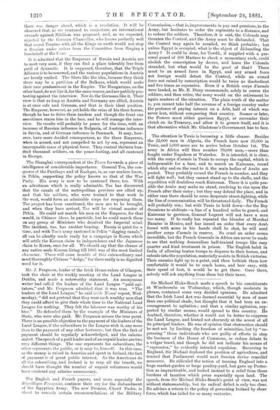The situation in Tunis is becoming a little clearer. Besides
the 32,000 men in Algeria, the French have now 33,000 in Tunis, and 5,000 more are to arrive before October 1st. The army in Africa will then number 70,000 men,—more than fought under Napoleon at Waterloo. It is intended, it is clear, with the corps d'armee in Tunis to occupy the capital, which is indispensable for a base, and to march on Kairouan, round which city and on the road to it the main bodies of Arabs are posted. They probably exceed the French in number, and they will fight well ; but they cannot stand up to the shells, and the expedition will doubtless reach Kairouan. There it is quite pos- sible the Arabs may make no stand, resolving to rise upon the French after their entry ; but they may defend the place, and in either case there should be some desperate street-fighting, while the line of communication will be threatened daily. The French will probably win ; but with Tunis to hold down—for the Bey threatens to abdicate—a line of a hundred miles to guard, and Kairouan to garrison, General Logerot will not have a man too many. If he really has repeated the blunder of Marshal Bazaine in Mexico, and has issued an order that every Arab found with arms in his hands shall be shot, he will need another corps d'armee in reserve. So cruel an order seems incredible, but the French Generals in Africa can never be made to see that nothing demoralises half-trained troops like easy quarter and kind treatment in prison. The English habit in India of allowing beaten troops to disperse to their homes, and subside into the population, materially assists in British victories. Their enemies fight up to a point, and then bethink them how comfortable it would be to reach home, and how easy, with their speed of foot, it would be to get there. Once there, nobody will ask anything from them but their taxes.






























 Previous page
Previous page